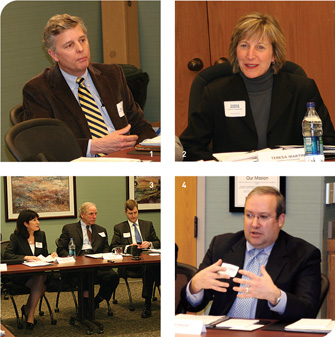
1: Bill Iler said the decision of many construction workers to retire, rather than wait for a recovery, was a simple matter of personal finances. | 2. Teresa Martin of the Lockton Companies said consolidation in the surety business during the 1990s had contributed to stability there in recent years. | 3.The assembly at Mark One Electric elicited a strong turnout from construction/design professionals and leading industry executives. | 4. Refinements in technology, said David Rezac, are making the entire industry more efficient, from design through construction.
Government Impact
GSA regional director Jason Klumb noted that irrespective of where people fall on the political spectrum, “There’s no disputing the fact that government money has had an impact, and the stimulus has stimulated.”
“I think that’s true,” said Rosie Privitera Biondo. “I mean, some people didn’t get some of that work, but it did help some contractors, and it did put on hours, and people did have jobs during that time.”
As David Kendrick observed, the different branches of the military and the GSA are still putting out work. Klumb confirmed this. The GSA is now in the process of ensuring that, once obligated, the work is done, and the contract price is paid out. He expects to see this continue to play out over the next several years.
One area of frustration for some has been the government’s failure to spend the money allotted for weatherization. David Kendrick complained that millions of available dollars have yet to be spent, and he “was struggling to figure out why they haven’t spent it in the last year and a half.”
As Parker Young noted, each individual home is managed as an individual project, which brings all the various regulatory pressures to bear and pushes up administrative costs.
From the government perspective, Klumb argued for the need to maintain industry best practices and to work as effectively and efficiently as possible given the regulatory burdens. “You all know there are plenty of laws and regulations covering this,” he explained, “and that is a result of the history of steps and missteps that have accorded in the past.”
Just about all the work that Jeff Riesberg has seen has been publicly funded—VA hospitals, military bases and the like. He does not blame the bankers for the slowdown in the private sector, but rather the fact that there is too much supply in the market. He joked that if you drove down on 135th Street in Johnson County, you would think that Mr. “For Lease” was the dominant player in the market.
According to Tom Vrabac, the office vacancy rate in greater KC is 18 percent. The one area besides multi-family that is strong is industrial, primarily warehouse space, and perhaps light manufacturing when that market returns.
Skilled Labor
One critical question Biondo posed to the builders was how the down period affected the skilled labor pool.
“One of the permanent effects,” said John Foudray, “is a lot of the skilled labor just left, and we are going to have to replace it.”
The problem may actiually be compounded, Randy Bredar observed, because of the aging of that skilled labor pool. He wondered whether the industry might have lost a generation of workers because of what has been going on in the economy.
Foudray noted that the average age in the carpenters union was about 55, and he doubted whether there was an adequate supply of young people to replace the veterans. “It’s going to be interesting,” he added.
As Bill Iler observed, any number of field people took early retirement. “They can cover their expenses and have health care covered,” added Brett Gordon. “Sitting at home, they’re not getting anything.”
The fact that the recession has lasted twice as long as usual, commented Don Greenwell, has made it more likely that skilled workers were not going to return.
“Another thing to think about,” said David Rezac, “the grad students coming out of school—they are coming out, and nobody is hiring. So they go to another profession and leave the industry.”
On the electrical side, said Biondo, fewer and fewer apprentices are entering the business. The failure to replace those leaving, she believes, is a long-term concern. “Your supervision is going to retire,” she asked, “but did your journeymen get enough experience for them to become superintendents?”